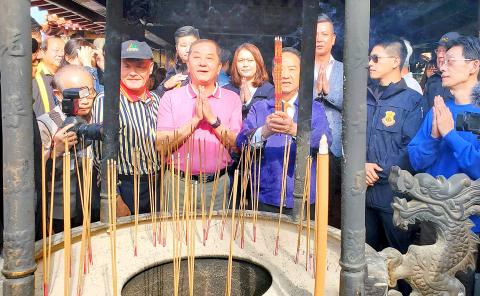People First Party (PFP) Chairman and presidential candidate James Soong’s (宋楚瑜) campaign schedule took him to central Taiwan yesterday.
During a visit to Zihnan Temple (紫南宮) in Nantou County, Soong said that Hon Hai Precision Industry Co founder Terry Gou (郭台銘) was also in Taichung, as both of them were sharing campaign work ahead of Saturday’s elections.
Soong said that if elected his administrative knowledge and Gou’s expertise in technology and innovation would become twin pillars on which Taiwan’s success would be built.

Photo: Hsieh Chieh-yu, Taipei Times
SUPPORTIVE DAUGHTER
Meanwhile, Soong’s daughter, Soong Cheng-mai (宋鎮邁), on Monday evening showed support for her father on Facebook.
Using the analogy of a smartphone updating its software based on existing infrastructure, Soong Cheng-mai said that her father, despite being described as “fond of reminiscing,” would be able to bring a unique perspective to issues, such as international relations, technological innovation and administrative efficacy, because of his experiences.
While Taiwanese claim to be proud of the nation’s democratic system of government, every election sees voters make a beeline for the polar opposites of the spectrum, she said.
CONSTRAINED
“Because of their extreme dislike and mistrust of each other, the supporters of the pan-green and pan-blue camps only cast their ballots to vote the other one out of power,” she said.
Citing her experience as a manager of a small company, Soong Cheng-mai said that during an election, Taiwanese should not have to sacrifice standards or innovation, or constrain themselves to party size or seniority.
She said she is proud of her father for not abandoning his principles or his belief in building a dignified government that would offer security for young people to pursue their dreams and effect change.
“Change begins with action,” she said, calling for people to support the PFP and her father’s presidential bid.
Additional reporting by Hsieh Chieh-yu

A small number of Taiwanese this year lost their citizenship rights after traveling in China and obtaining a one-time Chinese passport to cross the border into Russia, a source said today. The people signed up through Chinese travel agencies for tours of neighboring Russia with companies claiming they could obtain Russian visas and fast-track border clearance, the source said on condition of anonymity. The travelers were actually issued one-time-use Chinese passports, they said. Taiwanese are prohibited from holding a Chinese passport or household registration. If found to have a Chinese ID, they may lose their resident status under Article 9-1

Taiwanese were praised for their composure after a video filmed by Taiwanese tourists capturing the moment a magnitude 7.5 earthquake struck Japan’s Aomori Prefecture went viral on social media. The video shows a hotel room shaking violently amid Monday’s quake, with objects falling to the ground. Two Taiwanese began filming with their mobile phones, while two others held the sides of a TV to prevent it from falling. When the shaking stopped, the pair calmly took down the TV and laid it flat on a tatami mat, the video shows. The video also captured the group talking about the safety of their companions bathing

PROBLEMATIC APP: Citing more than 1,000 fraud cases, the government is taking the app down for a year, but opposition voices are calling it censorship Chinese Nationalist Party (KMT) Chairwoman Cheng Li-wun (鄭麗文) yesterday decried a government plan to suspend access to Chinese social media platform Xiaohongshu (小紅書) for one year as censorship, while the Presidential Office backed the plan. The Ministry of the Interior on Thursday cited security risks and accusations that the Instagram-like app, known as Rednote in English, had figured in more than 1,700 fraud cases since last year. The company, which has about 3 million users in Taiwan, has not yet responded to requests for comment. “Many people online are already asking ‘How to climb over the firewall to access Xiaohongshu,’” Cheng posted on

A classified Pentagon-produced, multiyear assessment — the Overmatch brief — highlighted unreported Chinese capabilities to destroy US military assets and identified US supply chain choke points, painting a disturbing picture of waning US military might, a New York Times editorial published on Monday said. US Secretary of Defense Pete Hegseth’s comments in November last year that “we lose every time” in Pentagon-conducted war games pitting the US against China further highlighted the uncertainty about the US’ capability to intervene in the event of a Chinese invasion of Taiwan. “It shows the Pentagon’s overreliance on expensive, vulnerable weapons as adversaries field cheap, technologically